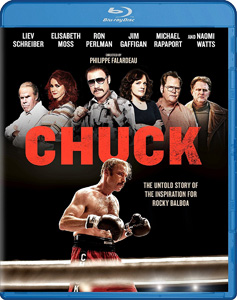Available via streaming and Redbox, “Chuck” was quietly in and out of theaters in 2017. The biopic’s titular character, Chuck Wepner (Liev Schreiber), is also under the radar: He was a local legend in Bayonne, N.J., and had a brush with national sporting fame in 1974 when he made it into the 15th round against Muhammad Ali before losing via TKO. This inspired Sylvester Stallone when writing “Rocky,” and for a time it was well-known that Wepner inspired the film’s boxing arc and Rocky’s job as a debt collector, but the public’s knowledge faded with time.
Directed by Canadian Philippe Falardeau and written by a team of four, including Schreiber, “Chuck” is a nice addition to the boxing genre but a fairly lightweight effort. While it gives a warts-and-all portrayal of the man, it doesn’t delve into one of the weirdest aspects of his life, and a fascinating intellectual property case that raised the question: “Do you own your life story?” He sued Stallone for being inspired by Wepner’s story without acknowledging or compensating him, and they reached an undisclosed settlement.
In “Chuck,” Stallone (Morgan Spector) is neither hero nor villain; he’s just someone on the periphery of the life of Chuck, who comes off as both a good-hearted guy and deeply self-centered. He’s desperate to be known as “The Champ,” even though he peaked at No. 8 in the world (although he was the New Jersey state champion). He’s a cocaine-addled screw-up outside the ring, even blowing an audition to play HIMSELF in a “Rocky II” cameo.
A viewer gains intimacy with him because the filmmakers use the old trick of voice-over narration. Outside the ring, he’s not at all like Rocky: When Chuck’s wife (Elisabeth Moss) departs with their daughter to escape his womanizing ways, and when his brother (Michael Rappaport) greets him coldly at a pop-in visit, we know Chuck is in the wrong, yet it’s hard to hate a guy while he’s telling you his life story and keeping you entertained. But it feels sneakily underplayed when Chuck doesn’t seem TOO out of sorts in the “Rocky II” audition or when showing up late to a parent-teacher meeting. Should people give Chuck a break, or are we seeing these scenes through Chuck’s rose-colored glasses?
Still, Chuck is undeniably horrible at life outside the ring, from not knowing his nephew’s name to getting caught up in cocaine snorting and drug dealing after his boxing career. His best friend, John (Jim Gaffigan), is a classic enabler, and – after his career – his manager and cut doctor Al (Ron Perlman) drops out of the narrative.
“Chuck” is not the best choice for great boxing action. It only chronicles a fight at the beginning to show why Chuck is known as the Bayonne Bleeder, and the Ali fight, which is a mix of archival footage and re-created action with Pooch Hall doing what he can to capture Ali’s immense stature. Aside from a one-liner, the film has nothing to say about the effects of repeated blows to the head on Chuck’s life. While he might be one of the lucky ones who shows no later-life trauma – he is still alive and well — it’s still surprising that a 2017 boxing film doesn’t touch on the concussion issue. Unless the WHOLE film is subtly about that issue.

Thanks to spot-on 1970s set design in the rough-and-tumble Garden State and chameleon-like performances by Schreiber and Naomi Watts as bartending goddess Linda, “Chuck” is worth seeing. As potential love interest Linda says, “There’s more to (Chuck) than meets the eye. Not a lot more, but enough.”
But the film is also ephemeral because of the man’s very nature. Despite Chuck taking ownership for his actions in the voiceovers, “Chuck” feels like a story about what happened to Wepner rather than about what he did. In the non-legal sense of the phrase, we wonder: Does Chuck Wepner own his own life story?

